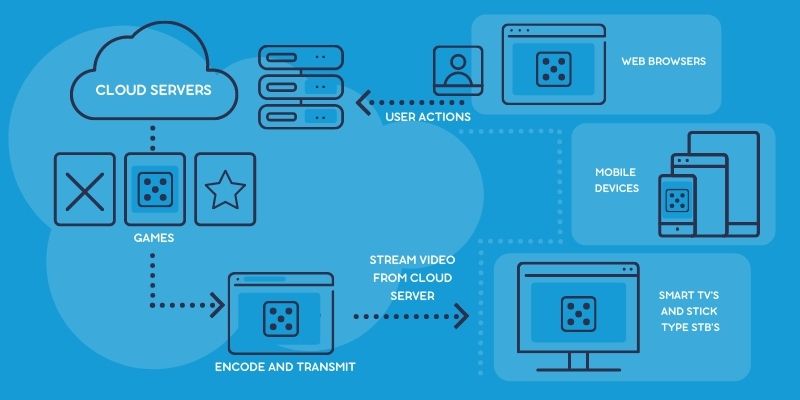Content Delivery Networks (CDNs): A Critical Component in the Online Gaming Infrastructure

Content Delivery Networks (CDNs) play a crucial role in optimizing the gaming experience for online players. By distributing game content and assets across a globally distributed network of servers, CDNs enable fast, reliable, and consistent delivery to gamers regardless of their location.

Key Benefits of CDNs in Online Gaming:

1. Reduced Latency:
CDNs minimize latency by caching game content and assets closer to players’ locations. This significantly reduces the time it takes for data to travel from the game server to the player’s device, leading to smoother and more responsive gameplay.
2. Increased Reliability:
CDNs provide redundancy and fault tolerance by distributing content across multiple servers. If a server goes down due to unexpected events, other servers can seamlessly take over, ensuring uninterrupted gameplay for players.
3. Improved Scalability:
CDNs can handle large volumes of concurrent players and spikes in traffic. By dynamically scaling up or down, they ensure that gamers have a consistently high-quality experience even during peak hours.
4. Optimized Network Performance:
CDNs optimize network performance by utilizing techniques such as packet prioritization and traffic shaping. This ensures that game traffic receives the necessary bandwidth and priority, minimizing interruptions and packet loss.
5. Security Enhancements:
CDNs provide additional layers of security by protecting game content from DDoS attacks, malware, and other threats. They implement security measures such as firewalls, intrusion detection systems, and content filtering to safeguard players’ information and game sessions.
How CDNs Work in Online Gaming:
- Content Distribution: Game developers and publishers partner with CDN providers to distribute their game content, including game files, textures, and audio assets.
- Caching and Edge Servers: CDNs cache game content on servers located at strategic points around the world, known as edge servers. These servers are strategically placed to be close to gamers.
- Player Requests: When a player accesses the game, the CDN automatically determines the nearest edge server and directs the player’s request to that server.
- Content Delivery: The edge server serves the cached game content to the player’s device, reducing latency and ensuring fast and reliable delivery.
- Redundancy and Load Balancing: If an edge server experiences high traffic or a technical issue, the CDN automatically redirects requests to other servers to maintain continuity of service.
Conclusion:
CDNs are an indispensable component of the online gaming infrastructure. They enable game developers and publishers to deliver fast, reliable, and secure gaming experiences to players worldwide. By minimizing latency, improving scalability, optimizing network performance, and enhancing security, CDNs ensure that gamers can enjoy immersive and uninterrupted gameplay.## Cdns: A Critical Component In The Online Gaming Infrastructure
Executive Summary
Content Delivery Networks (CDNs) are a vital component of the online gaming infrastructure and are essential for providing gamers with a fast, reliable, and secure gaming experience. By caching content closer to end-users, CDNs reduce latency and improve performance, enabling gamers to enjoy smooth gameplay, fast load times, and a seamless gaming experience.
Introduction
With the rise of online gaming, the demand for high-performance networking solutions has surged. Content Delivery Networks (CDNs) have emerged as a crucial technology in meeting this demand by providing gamers with a lightning-fast and uninterrupted gaming experience. In this article, we will delve into the critical role CDNs play in the online gaming infrastructure and explore their key benefits, components, and how they contribute to an enhanced gaming experience.
FAQs
What is a CDN and how does it work?
A CDN is a geographically distributed network of servers that stores cached content closer to end-users. When a user requests content, the CDN delivers it from the nearest server, reducing latency and improving performance.
Why is CDN important for online gaming?
CDNs play a vital role in online gaming by reducing latency, improving load times, minimizing packet loss, and providing gamers with a smooth and responsive gaming experience.
How do CDNs contribute to security in online gaming?
CDNs implement various security measures, such as SSL encryption, DDoS protection, and malware scanning, to safeguard data and protect gamers from cyber threats.
Top 5 Subtopics of CDN in Online Gaming
1. Latency Reduction
- Latency is the delay between a request and a response.
- CDNs reduce latency by caching content closer to end-users, minimizing the distance data needs to travel.
- Lower latency results in faster response times and smoother gameplay.
2. Improved Load Times
- Load times refer to the time it takes for a game or application to load.
- CDNs cache game assets and data at strategic locations, enabling faster loading times and reducing waiting times for gamers.
- Quick load times enhance the gaming experience and keep players engaged.
3. Minimized Packet Loss
- Packet loss occurs when data packets are lost during transmission, resulting in lag and disruptions.
- CDNs implement error correction mechanisms and redundant paths to minimize packet loss and ensure reliable data delivery.
- Reduced packet loss ensures a consistent and uninterrupted gaming experience.
4. Enhanced Security
- CDNs provide robust security measures to protect gamers from cyber threats.
- They implement SSL encryption to safeguard data transmissions, DDoS protection to mitigate attacks, and malware scanning to prevent malicious software from compromising systems.
- Strong security ensures a safe and secure gaming environment.
5. Global Reach and Scalability
- CDNs have a global presence with servers distributed across the world.
- This allows them to deliver content to gamers regardless of their location, reducing latency and ensuring a consistent experience.
- CDNs can scale dynamically to accommodate fluctuating traffic demands during peak gaming hours, maintaining optimal performance.
Conclusion
Content Delivery Networks (CDNs) are an indispensable component of the online gaming infrastructure, delivering significant benefits to gamers worldwide. By reducing latency, improving load times, minimizing packet loss, enhancing security, and providing global reach and scalability, CDNs empower gamers with a seamless, fast, and secure gaming experience. As the online gaming industry continues to grow and evolve, the role of CDNs will only become more critical in ensuring the highest possible quality of gaming for players around the globe.
Keyword Tags
- Content Delivery Networks (CDNs)
- Online Gaming Infrastructure
- Latency Reduction
- Improved Load Times
- Enhanced Security
